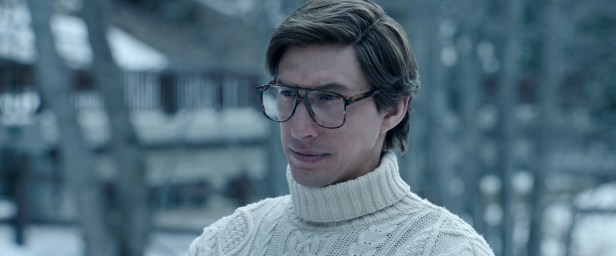House of Gucci (2021)
A legacy worth killing for.
There’s a moment in House of Gucci where Al Pacino’s Aldo Gucci advises his nephew Maurizio (Adam Driver) and his wife, low-class femme fatale Patrizia (Lady Gaga), to breathe in deeply and taste the scent of tradition. But they’re at the Gucci family farm/tannery, where pampered cattle are raised under luxurious conditions in order to produce the finest possible leather. They’re literally standing next to a herd of happy bovines. What they’re smelling is bullshit.
That’s the thesis — I think — of Ridley Scott’s House of Gucci, a sprawling, messy, self-indulgent account of the relationship between Gucci heir Maurizio and Patrizia, from their meet-cute at a disco-inflected party in 1978 up to his assassination in 1995. She had him whacked to prevent his upcoming second marriage from downsizing her alimony. Her personal psychic, Pina Auriemma (Salma Hayek), brokered the deal with the hitmen. Yes, Salma Hayek turns up in this thing in a small supporting role as a medium — that’s how large House of Gucci goes.

But going large is the order of the day — everything is excessive here. The production design, the exotic locations, the costumes (it’s a film about a fashion dynasty, after all), and especially the performances. And especially, especially the accents, with everyone bar Driver doing a full-on “it’sa me, Mario!” voice. Driver is the straight man, his comparatively subdued turn making everyone else look even more grotesque. Grotesque rich people doing awful things is a Ridley Scott staple; All the Money in the World (2017) is the obvious point of comparison, but even Gladiator (2000) had Commodus. Hell, even Blade Runner (1982) had Tyrell.
But House of Gucci goes out of its way to try and make us understand that all the talk of wealth and class and being born to the purple is self-aggrandizing bullshit. It’s just branding. At the end of the film, we’re told that nobody named Gucci currently works for Gucci — it’s only the label that matters, but early on Maurizio tells Patrizia that his family’s pretentions to nobility are just that — pretend. Granddad was a hotel porter with an eye for good leather goods who rolled the dice on founding a label and saw them come up boxcars; once the money hit, it was easy enough to buy class. It’s a fun revelation; up until that point, Patrizia has been framed as a gold digger ruthlessly seducing a merchant prince for her own advantage, but understanding that the Guccis are nouveau riche themselves, only a generation or two removed, refocuses the film, sharpening its satire.

And it is satire — God help you if you take this film seriously, or at face value. It’s a jape, and the ostentatious performances are part of the joke. Yes, Jared Leto, in kilos of makeup and an ugly bald cap as idiot cousin Paulo, is a complete caricature, but so too is Pacino as his father, and it’s hysterical to see them fight over jamming the last splinter of scenery down their throats. Jeremy Irons as family patriarch Rodolfo is more subtle in his caricature but still slides in the odd “how you say?” even though the characters are presumably speaking Italian in their reality and English on screen for our convenience. He’s also made up to look almost exactly like that one photo of Prince Phillip when Rodolfo is on death’s door, and I refuse to believe that’s coincidental.
I also refuse to believe Lady Gaga’s claims of method madness and having a psychiatric nurse on set due to the strain of keeping in character the whole time because, seriously, there’s no way that much effort goes into a performance that would slip into an Italian daytime soap opera without a ripple. That’s not me dissing GaGa; it’s just that all the promotional posturing is what the wrestling industry calls kayfabe: part of the fiction that sells the action.

I also don’t believe the plot is anything we’re supposed to pay attention to, except to marvel about how these goddamn people seemingly never have enough money or power and seem determined to fuck each other over for every possible extra advantage. The dynastic jostling is tiresome and really exists only as a scaffold upon which Scott can hang both his thematic concerns and his incredible eye for tone and style. House of Gucci is a delirious fever dream of a film, one in which our central couple step down the aisle to the strains of George Michael’s ‘Faith’ almost a decade before its release. To muddy the waters further, the real Maurizio and Patrizia were actually married in 1972, which makes their whole Studio 54-style first meeting bullshit. It’s bullshit all the way down, but that’s the point: these people are hollow, their histories and heritages carefully curated, their personalities calibrated — only their greed and malice are real. If Scott plays fast and loose with the facts, it’s not more so than the actual Gucci clan did.
House of Gucci is camp as a row of tents, but it’s intentional camp, not just in its aesthetic but in its themes. Scott makes a complete mockery of the famous family, but in rendering their murderous infighting as farce rather than tragedy, he doesn’t diminish it — he elevates it. Point and laugh at the Guccis, folks; it’s what Sir Ridley is doing, and he definitely wants us to join in.
4 / 5 – Recommended
Reviewed by Travis Johnson
House of Gucci is released through Universal Pictures Australia